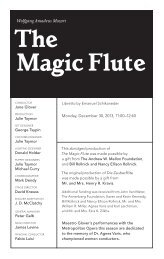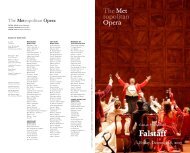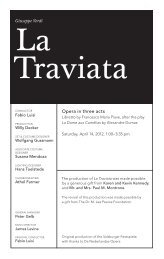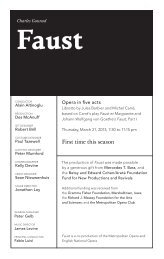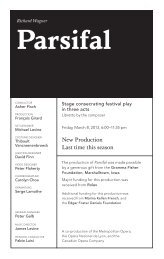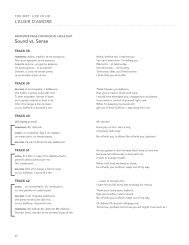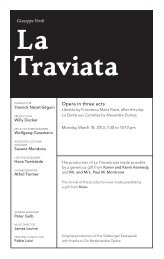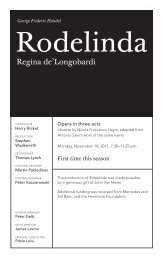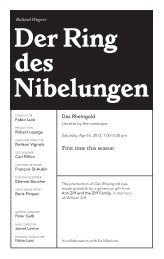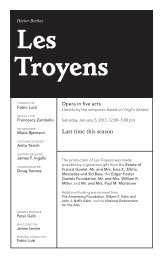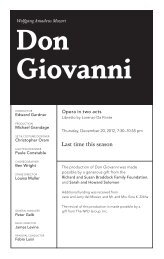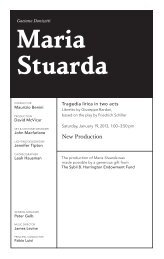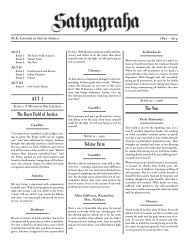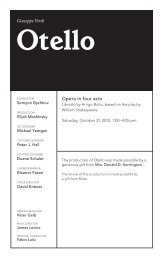Turandot - Metropolitan Opera
Turandot - Metropolitan Opera
Turandot - Metropolitan Opera
Create successful ePaper yourself
Turn your PDF publications into a flip-book with our unique Google optimized e-Paper software.
Giacomo Puccini<br />
<strong>Turandot</strong><br />
CONDUCTOR<br />
Dan Ettinger<br />
PRODUCTION<br />
Franco Zeffirelli<br />
SET DESIGNER<br />
Franco Zeffirelli<br />
COSTUME DESIGNERS<br />
Anna Anni<br />
AND<br />
Dada Saligeri<br />
LIGHTING DESIGNER<br />
Gil Wechsler<br />
CHOREOGRAPHER<br />
Chiang Ching<br />
STAGE DIRECTOR<br />
David Kneuss<br />
GENERAL MANAGER<br />
Peter Gelb<br />
MUSIC DIRECTOR<br />
James Levine<br />
PRINCIPAL CONDUCTOR<br />
Fabio Luisi<br />
<strong>Opera</strong> in three acts<br />
Libretto by Giuseppe Adami and Renato Simoni<br />
Saturday, September 29, 2012, 8:00–11:05 pm<br />
The production of <strong>Turandot</strong> is made<br />
possible by a generous gift from<br />
Mrs. Donald D. Harrington<br />
The revival of this production was made possible<br />
by a gift from The Dr. M. Lee Pearce Foundation
2012–13 Season<br />
The 288th <strong>Metropolitan</strong> <strong>Opera</strong> performance of<br />
Giacomo Puccini’s<br />
<strong>Turandot</strong><br />
Conductor<br />
Dan Ettinger<br />
<strong>Turandot</strong><br />
Maria Guleghina<br />
Liù<br />
Hibla Gerzmava<br />
Calàf<br />
Marco Berti<br />
Timur<br />
James Morris<br />
Emperor Altoum<br />
Ronald Naldi<br />
Ping<br />
Dwayne Croft**<br />
Pang<br />
Tony Stevenson**<br />
Pong<br />
Eduardo Valdes<br />
Three Masks<br />
Davis Robertson<br />
Andrew Robinson<br />
Amir Levy<br />
Saturday, September 29, 2012, 8:00–11:05 pm<br />
Mandarin<br />
Ryan Speedo Green *<br />
Executioner<br />
Antonio de Marco<br />
Prince of Persia<br />
Sasha Semin<br />
Handmaidens<br />
Anne Nonnemacher<br />
Mary Hughes<br />
Temptresses<br />
Linda Gelinas<br />
Oriada Islami Prifti<br />
Rachel Schuette<br />
Sarah Weber-Gallo
Maria Guleghina in the<br />
title role of Puccini’s<br />
<strong>Turandot</strong><br />
Yamaha is the official piano<br />
of the <strong>Metropolitan</strong> <strong>Opera</strong>.<br />
Latecomers will not be<br />
admitted during the<br />
performance.<br />
* Member of the<br />
Lindemann Young Artist<br />
Development Program<br />
** Graduate of the<br />
Lindemann Young Artist<br />
Development Program<br />
Visit metopera.org<br />
Chorus Master Donald Palumbo<br />
Musical Preparation Joan Dornemann, Steven Eldredge,<br />
Derrick Inouye, Carrie-Ann Matheson, and Carol Isaac<br />
Assistant Stage Directors Eric Einhorn and J. Knighten Smit<br />
Stage Band Conductor Gregory Buchalter<br />
Italian Coach Hemdi Kfir<br />
Prompter Carrie-Ann Matheson<br />
Children’s Chorus Director Anthony Piccolo<br />
Scenery, properties, and electrical props constructed and painted<br />
in <strong>Metropolitan</strong> <strong>Opera</strong> Shops and Totalinter, Rome<br />
Bamboo from Bamboo & Rattan Works<br />
Costumes executed by <strong>Metropolitan</strong> <strong>Opera</strong> Costume Department<br />
and Totalinter, Rome<br />
Headdresses executed by Gaelle Allen<br />
Wigs created by <strong>Metropolitan</strong> <strong>Opera</strong> Wig Department<br />
Costumes based on original designs by<br />
Anna Anni and Dada Saligeri for La Scala, Milan.<br />
By arrangement with Hendon Music, Inc., a Boosey & Hawkes<br />
company, Sole Agent in the US, Canada and Mexico for Casa<br />
Ricordi/Universal Music Publishing Ricordi S.R.L., publisher and<br />
copyright owner.<br />
This performance is made possible in part by public funds from<br />
the New York State Council on the Arts.<br />
Before the performance begins, please switch off cell phones<br />
and other electronic devices.<br />
Met Titles<br />
To activate Met Titles, press the red button to the right of<br />
the screen in front of your seat. To turn off the display, press<br />
the red button once again. If you have questions please ask<br />
an usher at intermission.<br />
Marty Sohl/<strong>Metropolitan</strong> <strong>Opera</strong>
38<br />
Synopsis<br />
Act I<br />
Outside the Imperial Palace in Peking<br />
Intermission (AT APPROXIMATELY 8:35 PM)<br />
Act II<br />
scene 1 The apartments of Ping, Pang, and Pong<br />
scene 2 Before the emperor’s throne<br />
Intermission (AT APPROXIMATELY 10:00 PM)<br />
Act III<br />
scene 1 The Imperial Gardens<br />
scene 2 Before the emperor’s throne<br />
Act I<br />
Outside the Imperial Palace a mandarin reads an edict to the crowd: any prince<br />
seeking to marry the princess <strong>Turandot</strong> must answer three riddles. If he fails,<br />
he will die. The most recent suitor, the Prince of Persia, is to be executed at<br />
the moon’s rising. Among the onlookers are the slave girl Liù, her aged master,<br />
and the young Calàf, who recognizes the old man as his long lost father, Timur,<br />
vanquished King of Tartary. When Timur reveals that only Liù has remained<br />
faithful to him, Calàf asks why. She replies that once, long ago, Calàf smiled at<br />
her. The mob cries for blood but greets the rising moon with a sudden fearful<br />
silence. When the Prince of Persia is led to his execution, the crowd calls upon<br />
the princess to spare him. <strong>Turandot</strong> appears, and with a contemptuous gesture<br />
orders that the execution proceed. As the victim’s death cry is heard from the<br />
distance, Calàf, transfixed by the beauty of the unattainable princess, strides to<br />
the gong that announces a new suitor. Suddenly <strong>Turandot</strong>’s three ministers, Ping,<br />
Pang, and Pong, appear to discourage him. Timur and the tearful Liù also beg<br />
him not to risk his life. Calàf tries to comfort her but then strikes the gong and<br />
calls <strong>Turandot</strong>’s name.<br />
Act II<br />
Inside the palace, Ping, Pang, and Pong lament <strong>Turandot</strong>’s bloody reign, praying<br />
that love will conquer her heart and restore peace. The three let their thoughts<br />
wander to their peaceful country homes, but the noise of the people gathering<br />
to hear <strong>Turandot</strong> question the new challenger calls them back to reality.
In the throne room before the assembled court, the old emperor asks Calàf to<br />
reconsider, but he will not be dissuaded. <strong>Turandot</strong> enters and describes how her<br />
beautiful ancestor, Princess Lou-Ling, was abducted and killed by a conquering<br />
prince. In revenge, she has turned against men and determined that none shall<br />
ever possess her. Facing Calàf, she poses her first question: What is born each<br />
night and dies each dawn? “Hope,” Calàf answers, correctly. <strong>Turandot</strong> continues:<br />
What flickers red and warm like a flame, yet is not a flame? “Blood,” Calàf replies<br />
after a moment’s thought. Shaken, <strong>Turandot</strong> delivers the third riddle: What is like<br />
ice but burns? Tense silence prevails until Calàf triumphantly cries, “<strong>Turandot</strong>!”<br />
The crowd erupts in joy, and the princess vainly begs her father not to give her<br />
to the stranger. Hoping to win her love, Calàf offers <strong>Turandot</strong> a challenge of his<br />
own: if she can learn his name by dawn, he will forfeit his life.<br />
Act III<br />
At night in the Imperial Gardens, Calàf hears a proclamation: on pain of death<br />
no one in Peking shall sleep until <strong>Turandot</strong> learns the stranger’s name. Calàf<br />
is certain of his victory, but Ping, Pang, and Pong try to bribe him to leave the<br />
city. As the fearful mob threatens him to learn his name, soldiers drag in Liù and<br />
Timur. Calàf tries to convince the crowd that neither of them knows his secret.<br />
When <strong>Turandot</strong> appears, commanding Timur to speak, Liù replies that she<br />
alone knows the stranger’s identity and will never reveal it. She is tortured but<br />
remains silent. Impressed by such fortitude, <strong>Turandot</strong> asks Liù’s secret. It is love,<br />
she replies. When the soldiers intensify the torture, Liù tells <strong>Turandot</strong> that she,<br />
too, will know the joys of love. Then she snatches a dagger and kills herself. The<br />
crowd forms a funeral procession and the body is taken away. <strong>Turandot</strong> remains<br />
alone to confront Calàf, who impetuously kisses her. Knowing emotion for the<br />
first time, <strong>Turandot</strong> weeps. Calàf, now sure of winning her, reveals his identity.<br />
Once again before the emperor’s throne, <strong>Turandot</strong> declares she knows the<br />
stranger’s name: it is Love.<br />
Visit metopera.org<br />
39
40<br />
In Focus<br />
Giacomo Puccini<br />
<strong>Turandot</strong><br />
Premiere: Milan, La Scala, 1926<br />
Puccini’s final opera is a huge and melodious fairy tale set in a China of legend.<br />
It has its roots in various folk tales about a princess who tests the worthiness<br />
of her suitors by posing a series of riddles and who has those who answer<br />
incorrectly killed. Puccini’s art soars in this most unusual score, which features<br />
an astounding use of chorus and orchestra that stands with any achievement<br />
in opera. Yet for all this, <strong>Turandot</strong> is recognizably Puccini, bursting with the<br />
instantly appealing melodies that are at the core of his universal popularity.<br />
The characters of Ping, Pang, and Pong are descended from the Italian<br />
tradition of commedia dell’arte that influenced much of the opera and drama<br />
of the 20th century. Puccini had planned to end this opera with a massive and<br />
transforming duet, but died before completing it.<br />
The Creators<br />
Giacomo Puccini’s (1858–1924) works are as popular today as they were in his<br />
own lifetime. The unenviable task of completing Turnadot’s final scene upon<br />
Puccini’s death was left to the composer Franco Alfano (1875–1954), whose<br />
rarely-performed opera Cyrano de Bergerac (1936) had its Met premiere in<br />
2005. Conductor Arturo Toscanini (1867–1957) oversaw Alfano’s contribution<br />
and conducted the world premiere. The opening night performance omitted<br />
the Alfano finale when the conductor opted to end the opera where Puccini<br />
was in the composition when he died. Subsequent performances at La Scala<br />
used Alfano’s ending, but, at Toscanini’s urging, a heavily cut version. The<br />
librettists for <strong>Turandot</strong> were the playwright and journalist Giuseppe Adami<br />
(1878–1946), who had previously written the librettos for Puccini’s Il Tabarro<br />
and La Rondine, and Renato Simoni (1875–1952), who had written librettos for<br />
other composers. The source of the story, supposedly suggested by Puccini<br />
himself, was the play <strong>Turandot</strong>te by the Venetian playwright Carlo Gozzi (1720–<br />
1806). Gozzi wrote satirical fantasies and later tragedies for the Venetian stage<br />
at a time of intense debate about the relative merits of realism and fantasy in<br />
dramatic art.<br />
The Setting<br />
Gozzi’s play used the commedia dell’arte characters in their original form. In<br />
his play they wandered from Italy to China and were members of the Imperial
court. Their comments satirized Venetian politics and mores of the times.<br />
Puccini and his librettists dispensed with any such relevance. The China of this<br />
opera, set in “legendary times,” is a mythical neverland where the clash of the<br />
sexes is drawn in high relief.<br />
The Music<br />
The large orchestra calls for a wide variety of instruments, including alto<br />
saxophones, celesta, bass xylophone, harps (originally designated to be<br />
muffled with pieces of paper between the strings), and an organ. Puccini uses<br />
the chorus to great effect in <strong>Turandot</strong>, from the bloodthirsty rabble urging<br />
on the executioner in Act I to the sublime “Hymn to the Moon” immediately<br />
following. There are several genuine Chinese themes used in <strong>Turandot</strong> that<br />
are integrated into the score in a suave and brilliantly original manner. The<br />
big anthem in Act II is based on a Chinese melody, but the orchestra plays<br />
harmonies derived from ancient European religious music and the remarkable<br />
resulting sound is not specific to any single culture. <strong>Turandot</strong>’s showstopping<br />
Act II aria, “In questa reggia,” and her succeeding confrontation<br />
with Calàf create an effect of Wagnerian proportions while still remaining<br />
in a firmly Italian style. The opera also contains moments of sheer melodic<br />
beauty that only Puccini could create, most notably in Liù’s plaintive aria<br />
from Act I, “Signore, ascolta,” and the tenor’s unforgettable song of triumph,<br />
“Nessun dorma!,” which opens Act III.<br />
<strong>Turandot</strong> at the Met<br />
The Met gave the United States premiere of <strong>Turandot</strong> in 1926, shortly after<br />
the world premiere in Milan. Tullio Serafin conducted a cast featuring one<br />
of Puccini’s favorite sopranos in the title role, Maria Jeritza, paired with<br />
Giacomo Lauri-Volpi as Calàf. This impressive duo led most of the subsequent<br />
revivals through the 1929–30 season, after which the opera (which had been<br />
considered an unusual departure for Puccini) disappeared for several decades.<br />
One of the highlights of the Met’s long performance history is the legendary<br />
1961 production of <strong>Turandot</strong> designed by Cecil Beaton featuring conductor<br />
Leopold Stokowski in his company debut and starring Birgit Nilsson, Franco<br />
Corelli, and Anna Moffo. The current production by Franco Zeffirelli had its<br />
premiere in 1987 with James Levine conducting and Eva Marton, Plácido<br />
Domingo, and Leona Mitchell. Other artists who have since taken on the<br />
leading roles include Gwyneth Jones and Jane Eaglen (<strong>Turandot</strong>); Aprile Millo,<br />
Teresa Stratas, Ruth Ann Swenson, and Angela Gheorghiu (Liù); and Luciano<br />
Pavarotti, Johan Botha, Salvatore Licitra, and Marcello Giordani (Calàf).<br />
Visit metopera.org<br />
41
2012–13 season<br />
Anna Netrebko and Ambrogio<br />
Maestri in L’Elisir d’Amore<br />
Photographed by Nick Heavican<br />
�e <strong>Metropolitan</strong> <strong>Opera</strong> is pleased to<br />
salute Deutsche Bank in recognition<br />
of its generous support during the<br />
2012–13 season.
Program Note<br />
One summer day in 1920, Giacomo Puccini had lunch in Milan with a<br />
45-year-old playwright and critic, Renato Simoni. Puccini was between<br />
operas, and his search for a libretto—a virtually constant element in<br />
his creative life—was becoming desperate. Somehow the conversation turned<br />
to the 18th-century Venetian writer Carlo Gozzi and his fanciful play <strong>Turandot</strong>te,<br />
a fairy tale set in an invented Orient. Perhaps, as he discussed details of the<br />
story with the younger man, Puccini was reminded of an earlier opera, Turanda,<br />
written by his onetime professor at the Milan Conservatory, Antonio Bazzini,<br />
and presented at La Scala in 1867. Or he and Simoni may have talked about<br />
a more recent Max Reinhardt production of the Schiller adaptation of Gozzi; it<br />
had enjoyed a huge success in Berlin. In fact, when Simoni later sent the text to<br />
the composer, it was the Schiller version translated into Italian by Andrea Maffei<br />
in the mid-19th century. The composer read it and was convinced.<br />
As always with Puccini, the choice of a libretto did not mean calm sailing<br />
toward his objective. He was at times assailed by doubts; he frequently badgered<br />
his collaborators (Simoni had been joined by the experienced Giuseppe Adami,<br />
librettist of La Rondine and Suor Angelica) for more words, but then, as he<br />
received the text, he demanded changes, cuts, and extensions. This tormented<br />
process went on for two years. Finally, on June 25, 1922, the composer could<br />
write to his publisher: “Propitious days for me…. Simoni and Adami have<br />
delivered to me the libretto of <strong>Turandot</strong>, finished to my complete satisfaction.”<br />
This did not mean there were no further changes, but the work of composition<br />
could go forward. By February 24, 1924, Puccini had completely orchestrated<br />
the first two acts; for the third, he was dissatisfied with the words of the final love<br />
duet, the culminating scene of the whole opera. The long-suffering librettists<br />
were set to work again. On March 13, Puccini wrote to his friend Sybil Seligman<br />
in London: “Adami is here to finish the libretto—the last duet, which has come<br />
out very well indeed.”<br />
But the same letter says, ominously: “I have not been at all well and I’ve still<br />
got a sore throat and an obstinate cough.” Over the next months in Puccini’s<br />
letters, complaints about a sore throat alternate with complaints about the<br />
difficulty of completing <strong>Turandot</strong>’s last act. The pain and discomfort finally<br />
became so great that Puccini consulted a specialist, who advised an operation<br />
at once. Puccini’s son was told the truth: the composer had an advanced cancer<br />
of the throat. Puccini himself and his wife were kept in ignorance of the real<br />
nature of his illness.<br />
At the beginning of November, Puccini was about to set off for Brussels,<br />
where the operation was to be performed. Arturo Toscanini, who was scheduled<br />
to conduct the premiere of <strong>Turandot</strong> at La Scala, was in Bologna preparing a<br />
production of Boito’s Nerone. With him was the director Giovacchino Forzano,<br />
a friend and librettist of Puccini’s and his neighbor in Viareggio. Forzano’s wife<br />
43
44<br />
Program Note CONTINUED<br />
telephoned to tell him of the imminent journey of the composer. Forzano and<br />
Toscanini went at once to visit Puccini, as the director recalls in his memoirs:<br />
The next morning, with my car, Toscanini and I reached Viareggio. Puccini was<br />
expecting us. Toscanini’s visits cheered him. He thanked him, and was happy<br />
that Toscanini had taken his Chinese creature to heart. He showed him the whole<br />
score of <strong>Turandot</strong>; only a little was lacking to complete it. Once he was back from<br />
Brussels he would finish the opera quickly, and he played many passages for us.<br />
Unaware of the seriousness of his illness, he joked about the change in his voice.<br />
“You hear my tenor’s voice, Arturo?” and, still joking, he vocalized…. We went<br />
back to Bologna. We didn’t exchange a word during the whole journey. This was<br />
on November 3, 1924.<br />
The next day, when Puccini got into the Brussels train, he was carrying in his<br />
suitcase 36 sheets of music paper, all scrawled over with notes: his sketches for<br />
the final duet. There are false starts, jotted themes, melodies to be developed,<br />
and cryptic messages to himself: “find melody,” “less silly than the other,” and—<br />
most puzzling—“then Tristan.”<br />
The treatment was, it seemed, a success. But suddenly, on November 28,<br />
Puccini had a heart attack and died the following day. There was a funeral service<br />
in Brussels, and another in the Milan cathedral, where Toscanini conducted. Then<br />
there was the impelling question: what to do with <strong>Turandot</strong>? After considering<br />
other solutions, Toscanini turned to Franco Alfano, a successful composer of<br />
operas in his own right. The Italian critic Teodoro Celli wrote, some years ago,<br />
of Puccini’s sketches: “An examination of the material…can inspire in us only<br />
admiration for what Alfano managed to achieve, not only with an expert’s great<br />
mastery, but also with extreme respect and loyalty towards Puccini’s intentions.”<br />
On the night of <strong>Turandot</strong>’s posthumous premiere, April 25, 1926 (with Rosa<br />
Raisa in the title role, Miguel Fleta as Calàf, and Maria Zamboni as Liù), the<br />
audience at La Scala was unable to admire Alfano’s work. Close to the end<br />
of Act III, after the chorus lamented the death of Liù, Toscanini set down his<br />
baton and turned to the house, saying, more or less (he has been variously<br />
quoted): “Here the opera ends, because at this point the maestro died.” At<br />
subsequent performances the Alfano ending was performed, but—at Toscanini’s<br />
insistence—heavily cut. In recent years the full Alfano edition has been revived,<br />
but its length—however accomplished musically—seems to chill the drama<br />
and the finale, and Toscanini’s abbreviated version remains more popular and<br />
practical. —William Weaver<br />
Visit metopera.org
2012–13 Season<br />
NEW PRODUCTIONS<br />
L’Elisir d’Amore<br />
The Tempest<br />
Un Ballo in Maschera<br />
Maria Stuarda<br />
Rigoletto<br />
Parsifal<br />
Giulio Cesare<br />
REPERTORY<br />
Aida<br />
The Barber of Seville<br />
Carmen<br />
La Clemenza di Tito<br />
Le Comte Ory<br />
Dialogues des Carmélites<br />
Don Carlo<br />
Don Giovanni<br />
Faust<br />
Francesca da Rimini<br />
Le Nozze di Figaro<br />
Otello<br />
La Rondine<br />
La Traviata<br />
Il Trovatore<br />
Les Troyens<br />
<strong>Turandot</strong><br />
DER RING DES NIBELUNGEN<br />
Das Rheingold<br />
Die Walküre<br />
Siegfried<br />
Götterdämmerung<br />
metopera.org 212.362.6000<br />
Simon Keenlyside in The Tempest<br />
photographed by Anne Deniau.
The Cast<br />
Dan Ettinger<br />
conductor (tel aviv, israel)<br />
this season Das Rheingold, Die Walküre, Siegfried, Götterdämmerung, Tosca, and<br />
a concert performance of Otello in Mannheim, <strong>Turandot</strong> at the Met, La Traviata with<br />
Munich’s Bavarian State <strong>Opera</strong>, Tosca with the Vienna State <strong>Opera</strong>, and concerts with the<br />
Tokyo Philharmonic and Israel Symphony Orchestra.<br />
met appearances Le Nozze di Figaro (debut, 2009).<br />
career highlights He has been general music director of Mannheim’s National Theater<br />
since 2009, became chief conductor of the Tokyo Philharmonic in 2010, and has served<br />
as music director and principal conductor of the Israel Symphony Orchestra since 2005.<br />
Recent performances include Rigoletto for his debut at Covent Garden, Le Nozze di<br />
Figaro for his debut at the Paris <strong>Opera</strong>, Carmen with the Bavarian State <strong>Opera</strong>, and<br />
L’Italiana in Algeri at the Vienna State <strong>Opera</strong>.<br />
Hibla Gerzmava<br />
soprano (pitsunda, russia)<br />
this season Liù in <strong>Turandot</strong> at the Met, Vitellia in La Clemenza di Tito at the Vienna State<br />
<strong>Opera</strong>, Mimì in La Bohème at Covent Garden, Violetta in La Traviata on tour in Athens<br />
with Moscow’s Stanislavsky and Nemirovich-Danchenko Musical Theatre, and recitals in<br />
Moscow and Perm.<br />
met appearances Mimì in La Bohème and Antonia in Les Contes d’Hoffmann (debut, 2010).<br />
career highlights Recent performances include Mimì at Covent Garden, for her debut<br />
with Munich’s Bavarian State <strong>Opera</strong>, and in Rome, and Violetta for her debut at Valencia’s<br />
Palau de les Arts. She has also appeared as Eva in Haydn’s Die Schöpfung and the Angel<br />
in Cavalieri’s Rappresentazione di Anima e di Corpo at Germany’s Ludwigsburg Festival,<br />
and as Lyudmila in Glinka’s Ruslan and Lyudmila, the Swan Princess in Rimsky-Korsakov’s<br />
The Tale of Tsar Saltan, Louisa in Prokofiev’s Betrothal in a Monastery, Rosina in Il Barbiere<br />
di Siviglia, Mimì and Musetta in La Bohème, the title role of Lucia di Lammermoor, and<br />
Adele in Die Fledermaus at the Stanislavsky and Nemirovich-Danchenko Musical Theatre.<br />
47
48<br />
The Cast CONTINUED<br />
Maria Guleghina<br />
soprano (odessa, ukraine)<br />
this season The title role of <strong>Turandot</strong> at the Met and in Malta and a gala concert at<br />
Moscow’s Stanislavsky and Nemirovich-Danchenko Musical Theatre.<br />
met appearances More than 150 performances, including Abigaille in Nabucco, Lady<br />
Macbeth in Macbeth, Norma, Lisa in The Queen of Spades, the title role of Adriana<br />
Lecouvreur, Maddalena in Andrea Chénier (debut, 1991), Tosca, Aida, Santuzza in<br />
Cavalleria Rusticana, Dolly in Sly, and Giorgetta in Il Tabarro.<br />
career highlights Tosca, Lady Macbeth, Abigaille, and Odabella in Attila at the Paris<br />
<strong>Opera</strong>; Violetta in La Traviata in Japan; Norma at the Santander and La Coruña festivals;<br />
Abigaille, Tosca, and Maddalena with the Vienna State <strong>Opera</strong>; Elena in a concert version<br />
of I Vespri Siciliani with the Washington National <strong>Opera</strong>; Abigaille at St. Petersburg’s<br />
Mariinsky Theatre; and 15 new productions at La Scala.<br />
Marco Berti<br />
tenor (como, italy)<br />
this season Calàf in <strong>Turandot</strong>, Radamès in Aida, and Manrico in Il Trovatore at the Met,<br />
Cavaradossi in Tosca with the Los Angeles <strong>Opera</strong>, Manrico with the Houston Grand <strong>Opera</strong>,<br />
Radamès in Salerno and with the Berlin State <strong>Opera</strong>, and Cavaradossi with Paris’s Bastille<br />
<strong>Opera</strong>.<br />
met appearances Pinkerton in Madama Butterfly (debut, 2004), Don José in Carmen, and<br />
Cavaradossi in Act II of Tosca for the opening of the 2005–06 season.<br />
career highlights Recent performances include Radamès at the Arena di Verona, Pollione<br />
in Norma in Turin, Calàf and Cavaradossi with Munich’s Bavarian State <strong>Opera</strong>, and Calàf<br />
with the San Francisco <strong>Opera</strong>. He has also sung the title role of Otello at La Coruña<br />
Festival, Enzo in La Gioconda and Don José at the Arena di Verona, Pinkerton at Covent<br />
Garden, Rodolfo in La Bohème at the Los Angeles <strong>Opera</strong>, Radamès at La Monnaie in<br />
Brussels, Don José with the San Francisco <strong>Opera</strong>, and Riccardo in Un Ballo in Maschera<br />
at Trieste’s Teatro Verdi. At La Scala he has sung Cavaradossi, Rodolfo, Ruggero in La<br />
Rondine, and Macduff in Macbeth.
The Cast CONTINUED<br />
James Morris<br />
bass (baltimore, maryland)<br />
this season Timur in <strong>Turandot</strong> and Lodovico in Otello at the Met, Hans Sachs in a new<br />
production of Die Meistersinger von Nürnberg with Lyric <strong>Opera</strong> of Chicago, and the<br />
Doctor in Wozzeck with English National <strong>Opera</strong>.<br />
met appearances He has been heard in more than 900 performances and 60 roles since his<br />
1971 debut, including Wotan in Wagner’s Ring cycle, Claggart in Billy Budd, Jacopo Fiesco<br />
in Simon Boccanegra, Scarpia in Tosca, Claudius in Hamlet, Dr. Schön/Jack the Ripper in<br />
Lulu, Hans Sachs in Die Meistersinger von Nürnberg, Iago in Otello, Amonasro in Aida,<br />
Méphistophélès in Faust, and the title role of Don Giovanni.<br />
career highlights He has appeared in all the world’s leading opera houses and with the<br />
major orchestras of Europe and the United States. One of the leading interpreters of<br />
Wagner’s Wotan, he has sung the role in cycles at the Vienna State <strong>Opera</strong>, Bavarian State<br />
<strong>Opera</strong>, Deutsche Oper Berlin, Lyric <strong>Opera</strong> of Chicago, and San Francisco <strong>Opera</strong>, among<br />
others.<br />
50 Visit metopera.org



